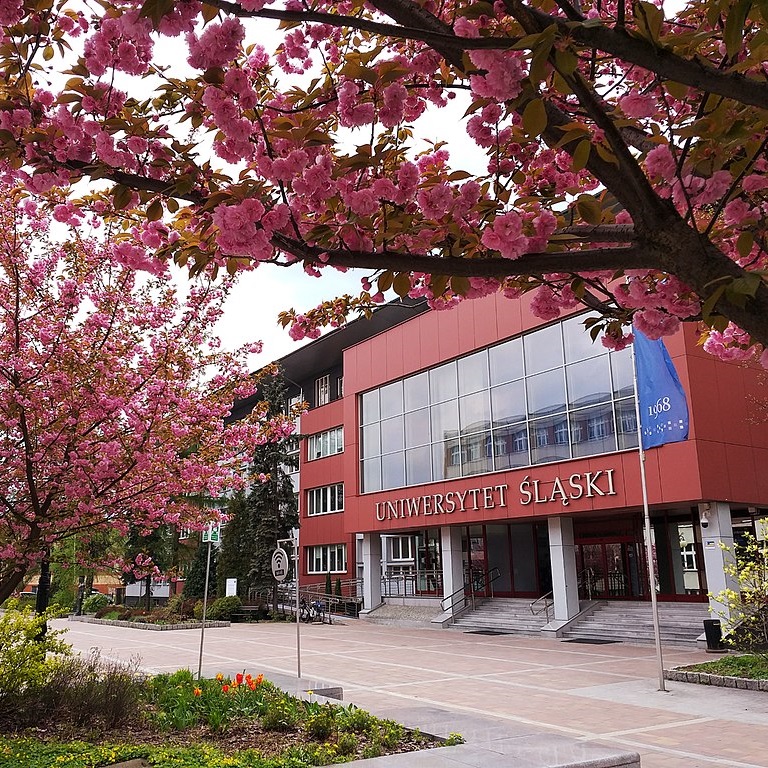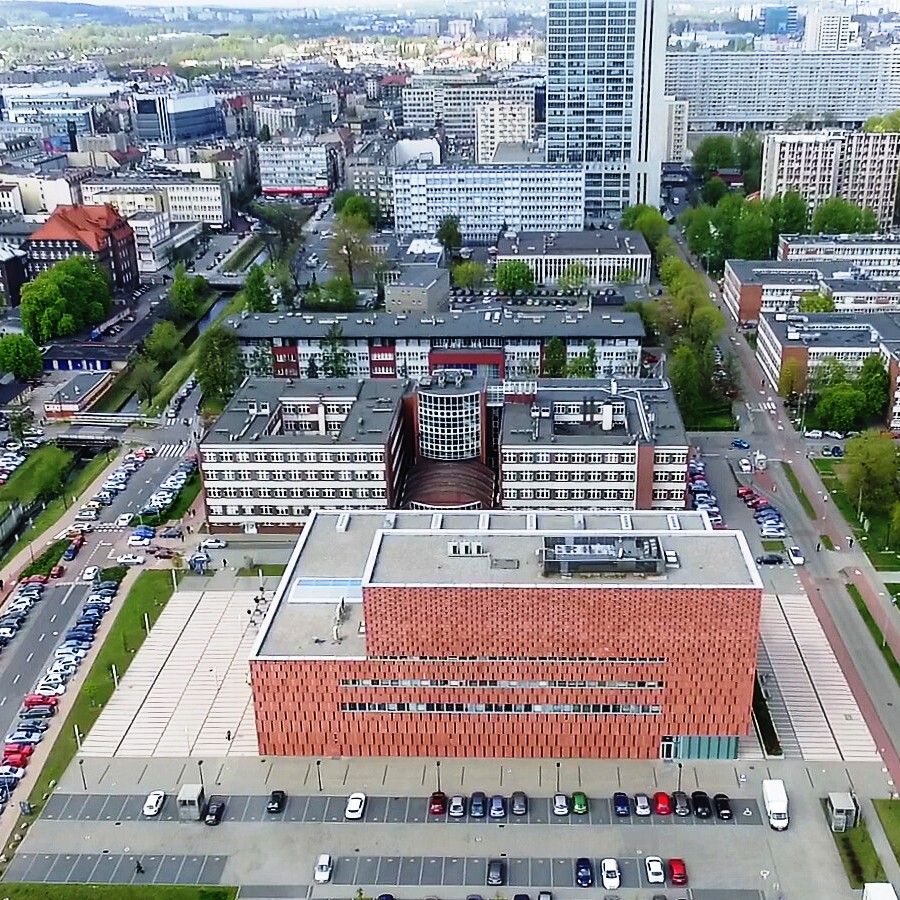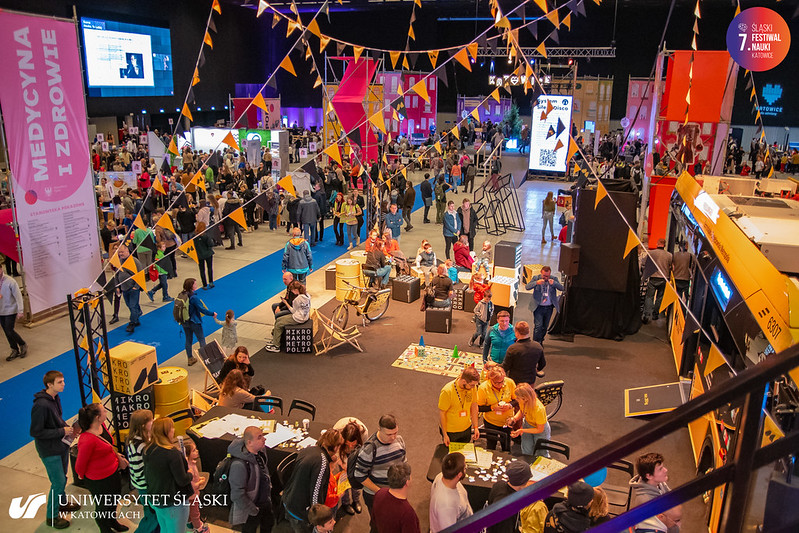Home » Katowice – Host city » Science and Education
Science
&Education
It is no coincidence Katowice was titled the European City of Science 2024. The city stands out in Europe in terms of high-quality teaching, innovative research and interdisciplinarity necessary for comprehensive development.

The University of Silesia in Katowice – the EUCYS 2024 Organiser | Photo: The University of Silesia material
Seven Universities
With 11 universities (not counting divinity schools) and 3 branches, the city is the largest higher education centre in the Metropolis GZM and one of the largest in Poland.
At the end of 2021, with the announcement of awarding Katowice the title of the European City of Science 2024, the Academic Consortium – Katowice City of Science was established to strengthen inter-university cooperation and expand the potential of Katowice as a City of Science.

Katowice – Campus of the University of Silesia, the leader of the Academic Consortium | Photo: The University of Silesia archive
The Academic Consortium – Katowice City of Science is formed by 7 universities
The might of the Academic Consortium is best expressed by the statistics. Within its fundamental mission, the universities forming the Consortium educate nearly 60,000 students in 747 degree programmes and majors. The educational process is carried out by 6,068 academic employees, supported by 1,787 PhD students and 4,761 non-academic employees.
Karol Szymanowski Academy of Music in Katowice
The oldest university in Upper Silesia. Its graduates frequently join the ranks of the best Polish chamber and symphonic ensembles, musical theatres, music schools of all grades and music editorial teams in the press, radio and television. The rank of an art school is best expressed by the feats of its graduates, and there are many of them. Just mention the names of graduates of the Jazz and Pop Music Faculty who are recognised in Poland and abroad: Krystyna Prońko, Lora Szafran, Stanisław Sojka, Mieczysław Szcześniak, Ewa Uryga, Iza Zając, Janusz Szrom, Katarzyna Klich and Agnieszka Wilczyńska.
More at: https://am.katowice.pl/
Academy of Fine Arts and Design in Katowice
The Academy comprises two faculties, the Faculty of Art and the Faculty of Design. Although the Academy is a relatively young university, its students are often recognised and appreciated in various Poland national contests. The Academy has a space used as a contemporary art gallery called Rondo Sztuki located next to the Spodek Arena.
More at: https://asp.katowice.pl/
Jerzy Kukuczka Academy of Physical Education in Katowice
I have something inside me that makes me have no interest in playing for low stakes. For me, it is the high bid or nothing. That’s what fires me — these words by Jerzy Kukuczka are deeply rooted in the hearts of many Academy graduates. The Academy of Physical Education in Katowice is the masterclass. Its graduates represent Poland at the world’s major sporting events. Ewa Swoboda (track and field sprinter, three-time European Indoor Championships medallist, having won gold and two silvers), Dawid Kubacki (ski jumper, two-time Olympic bronze medallist and the World Champion), and Anita Włodarczyk (three-time Olympic gold medallist in hammer throw, and the holder of the current women’s world record).
More at: https://awf.katowice.pl/
Silesian University of Technology
The University comprises 13 faculties and the Centre for Science and Education; it offers as many as 60 degree programmes. According to the Ranking Web of Universities of July 2023 measuring the scientific activity on the Web, the university took 3rd place among technical universities (7th place among all universities) in Poland and 824th place among all universities in the world. One of its graduates is the current Mayor of Katowice – Marcin Krupa, PhD, who received the degree of Doctor of Technical Sciences.
More at: https://www.polsl.pl/
Medical University of Silesia in Katowice
One of Poland’s largest medical universities and the largest in the Silesian Voivodeship, the University has already educated several generations of doctors. It takes an innovative approach to research, and is a hub for many influential and impactful projects. One of the most recent achievements is the HematopoiesISS Team (Medical University of Silesia and the Jagiellonian University in Krakow); since November 2023, the Team has been developing a project to study CD34+ bone marrow-derived haematopoietic stem cells under the conditions of the International Space Station. The team made it to the finals and won a grant within the ‘Direction: Space’ contest.
More at: https://sum.edu.pl/
University of Economics in Katowice
Operating since 1937, the University is one of the five state economic universities in the country and the largest university in the region, educating nearly 10,000 students in the field of socio-economic sciences. It is the alma mater of first-class economists, managers, entrepreneurs, and analysts. The students may enjoy a rich offer of international internships from a range of over 300 companies worldwide. The University of Economics was the best in the International Student Satisfaction in Europe 2014 ranking by StudyPortals.
More at: https://www.ue.katowice.pl/
University of Silesia in Katowice – Leader of the Academic Consortium
The University of Silesia in Katowice is a modern university with a long tradition of acquiring knowledge, and nurturing relationships; it is the largest academic university in the Silesian Voivodeship and one of the largest in Poland. It is comprised of 7 Faculties: of Humanities; of Natural Sciences; of Social Sciences; of Science and Technology; of Law and Administration; of Arts and Educational Science; of Theology; Krzysztof Kieślowski Film School, and inter-faculty and university units.
The University is open to cooperation and has a significant impact on the life of Katowice. The University of Silesia is the originator and leader of the Silesian Science Festival KATOWICE, one of Poland’s largest science festivals; in this regard, it is acting in partnership with nine Silesian universities, in cooperation with the City of Katowice, the Metropolis GZM and the Silesian Voivodeship. The event has been organised since 2016 and won the ‘Golden Rose’ – the first prize for the best marketing campaign among popular science events during the EUPRIO Awards 2019, and the Popularizer of Science Award in the team category by the ‘Science in Poland’. Thanks to the cooperation between the seven Katowice-based public universities and the local government units, it was possible to secure the title of the European City of Science 2024 for Katowice.
The University has been implementing over 200 R&D projects within the call for proposals by, e.g. the National Science Centre, the National Centre for Research and Development, the Ministry of Science and Higher Education. Additionally, the University supports approx. 250 student research and art groups, the Student Song and Dance Ensemble ‘Katowice’, along with various media involving students, e.g. Suplement Student Magazine, University of Silesia Magazine, Egida Student Radio.
For many years, the University of Silesia was associated primarily with humanities education; however, recently, thanks to the implementation of projects promoting exact sciences and investments in new buildings of the Silesian Interdisciplinary Centre for Chemistry and the Centre for Biotechnology and Biodiversity (which are planned to be built by 2029), the University is becoming increasingly more open to STEM disciplines. The same applies to researchers in the humanities who are more often seen to cooperate with the exact sciences, creating interdisciplinary works and projects. An example may be the task called ‘Transformers in schools – education for green transition and preserving mining culture in the region’; Marta Tomczok, PhD, DLitt, Assoc. Prof. (a literary scholar, the Institute of Literary Studies) and Iwona Jelonek, PhD, DSc, Assoc. Prof. (a geologist, the Institute of Earth Sciences) joined forces to conduct educational activities among young people, combining literary studies with earth sciences and ecology.
More at: https://us.edu.pl
Silesian Science Festival KATOWICE
The 8th edition of the Silesian Science Festival will be held from 7 to 9 December 2024 in the International Congress Centre in Katowice. The event will mark the culmination of a year-long celebration of awarding the title of European City of Science 2024 to Katowice.
The Silesian Science Festival is a unique, cyclical event popularising science, organised in Katowice since 2016. Its aim is to actively engage people of all ages in the pursuit of knowledge. The festival’s programme includes hundreds of various activities popularising science and art, such as lectures, workshops, exhibition stands, exhibitions, concerts, meetings with special guests and more. The festival space has been divided into six zones dedicated to natural sciences, technology, humanities and social sciences, exact sciences, medicine and health, as well as arts and special zones. The scale of the event is reflected in the number of visitors during last year’s edition.
7th edition of the Silesian Science Festival KATOwice and KATOPOLIS
The 7th edition of the Silesian Science Festival, held in 2023, proved to be a big success. The event drew nearly 70,000 people, with almost 10,000 people watching the online broadcasts. The festival featured 120 special guests from Poland and abroad, including Dawid Myśliwiec, Paulina Różyło-Nowicka, Prof. Andrzej Dragan, Prof. Krzysztof Zanussi, Ewelina Zambrzycka-Kościelnicka, Prof. Berners-Lee, Prof. Derrick de Kerckhove, Alaina Wood, Greg Foot and Niamh Shaw, PhD.
A highlight of the event was KATOPOLIS – a spectacle that launched the 7th edition of the Silesian Science Festival and inaugurated the celebrations of the European City of Science 2024.
This unique music and science performance was a collaborative effort of scientists from Katowice universities, actors from regional theatres, and artists from the Polish music scene, university choirs, and musical groups. The event was designed by Miuosh – rapper and record producer; Zbigniew Rokita – writer and journalist, winner of the Nike Literary Award; Jan P. Matuszyński, PhD – director of narrative films and documentaries; Mateusz Znaniecki – actor and film director. The performance featured an impressive lineup of artists including Natalia Grosiak, Julia Pietrucha, Dawid Tyszkowski, Piotr Rogucki, Mela Koteluk, Krzysztof Zalewski, Natalia Szroeder, Igo and Jan Stokłosa. Unforgettable musical experiences were also provided by: ‘Harmonia’ Choir of the University of Silesia, Choir of the University of Economics in Katowice, Choir of the Medical University of Silesia in Katowice, Academic Choir of the Silesian University of Technology, Cieszyn Brass Band of the University of Silesia in Katowice, Stokłosa Collective Orchestra, and Student Song and Dance Ensemble ‘Katowice’ of the University of Silesia in Katowice. The spectacle also featured actors of the Silesian Theatre, Korez Theatre, and Teatr Rozrywki: Grażyna Bułka, Marcin Gaweł, Barbara Lubos, Izabela Malik, Mirosław Neinert, Wiesław Sławik and Robert Talarczyk.
KATOPOLIS, hosted at the Spodek Arena, attracted a live audience of as many as 6,000 spectators.

The participants of the 7th edition of the Silesian Science Festival KATOWICE | Photo by Matylda Klos


